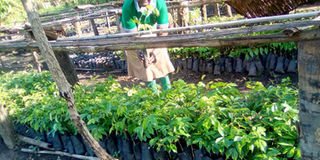Herbalists push to restore endangered tree species

Ready. Ms Juliet Adoch sorts out seedlings that are ready for supply at the farm in Bungatira Sub-county, Gulu District last week. PHOTO BY CISSY MAKUMBI
What you need to know:
Worry. Shea and Afzeila African, at the moment, are the most endangered tree species in northern Uganda. As a results, herbalists think if they are not protected, they could go into extinction yet they have many medicinal benefits, write Cissy Makumbi & Stephen Okello.
Several nursery beds are visibly seen with Shea and Afzeila African seedlings that are being raised on seven acres of land in Bungatira Sub-county, Gulu District before they are planted to the mother garden.
The seedling project is being engineered by 15 herbalists, all women under their umbrella body, Native Seeds Project Ecological Restoration.
Shea and Afzeila African, at the moment, are the most endangered tree species in the north.
There is a lucrative market for Afzeila Africana timber in Asian countries where they are used for making furniture and crafts, while Shear tree is the most preferred tree due to its hard charcoal.
The restoration project that was initiated in 2016, has so far seen a total of 20,575 seedlings being distributed in most sub-counties in Gulu District and majority of the seedlings are Shear and Afzeila African.
Apart from the Shear and Afzeila African, they are also key in protecting other native trees such as Muvule, Musizi, Mahogan and other shrubs that are said to be medicinal. At the moment, sub-counties of Owor, Bungtaira, Unyama all in Gulu District, are benefiting since they are the most affected in massive tree cutting.
The director of Wise Women Uganda, Ms Juliet Adoch, says most of the endangered trees are medicinal and as herbalists, they were having difficulties getting such trees thus embarking on the protection and restoration process.
“Like Shear seeds when processed, it has oil which is rich in vitamin A, E and F, and it helps people who suffer from ulcers. It is also used as cooking oil and smearing jerry for both children and adults,” Ms Adoch says.
She, however, says before the seedlings are given out to the community beneficiaries, they are first trained on the benefits, ranging from environmental protection and medicinal benefits.
Ms Adoch says the training of the beneficiaries and close monitoring of the given seedlings makes them own what they have been able to plant.
“In some places, the trees are now three years old and doing very well. In the past, we had a tendency that Shea and Afzeila African just grow on their own but we have proved that they are planted just like other trees and if well maintained, they can grow faster,’’ Ms Adoch adds.
She says seeds, especially for shear and Afzeila African, are got from Lamwo and Kotido districts at the border of Uganda and Sudan.
“Surprisingly, since we started the initiative, some trees in the communities have progressed on very well. The demand is high among the communities and the demonstration farms,” she says.
The project manager, Mr Lincoln Ocaya, says the hurdle being faced now is where to get the mature trees that can produce seeds of good quality.

Grown. Mr Lincoln Ocaya checks Shea seedling at the farm.
“Most trees have been destroyed for personal purposes without being replaced but for us, since we want the future generation to find a better environment, we shall take the initiative of restoration no matter what,” Mr Ocaya says.
Most affected
He adds that they are aiming at restoring in the most affected districts in Acholi Sub-region, where the depletion has been massive.
He says while carrying out restoration, trainings are also being held on tree management.
He adds that the place has become a learning centre where students who are doing pharmacology converge for learning purposes about the native trees.
“Gulu University and Jerusalem School of Pharmacology have visited this centre. We are expecting students doing medicine from Mbarara University of Science and Technology, Lacor Training School and Makerere University this month,” he says.
The coordinator of Our Trees We need Answer, Mr Arthur Owor, lauds the herbalist group for taking the lead in preservation and restoration of what has been destroyed.
“It is in line with our key objective that Shea and Afzeila African restoration campaign in the region,” he says.
Our Trees We need Answer is a pressure group that is advocating for the stop on massive tree cutting in Acholi Sub-region.
The prime minister of Acholi Cultural Institution, Mr Ambrose Olaa, appreciates the herbalists for their wise decision of restoration, adding of the tree species that are being cut are vital in Acholi culture because some of them are used for cleansing the body and other rituals.
He calls on the government to support the initiative of tree planting, especially in Acholi where massive destruction has taken place.
Suspension
In 2017, the State Minister for Environment, Ms Mary Goretti Kitutu, issued a temporary suspension of cutting, transportation, and sale of Afzelia Africana trees, Shea trees, and their products, saying government was still in the process of reviewing and harmonising the licensing, harvesting and movement of the products.
Afzelia Africana species are used primarily for wood, though some species also have medicinal uses. The timber is most commonly traded under the collective name “doussie”, as well as under name “afzelia”.
One of the common names is also “pod mahogany”, adding to the confusion surrounding the name mahogany. The seeds are red and black and are used as beads. The wood is often used as the surface material for outdoor velodromes.
The highly figured wood of the Asian species, Afzelia xylocarpa, is sold as Afzelia xylay. The seeds and bark of this species are used as medicine.




